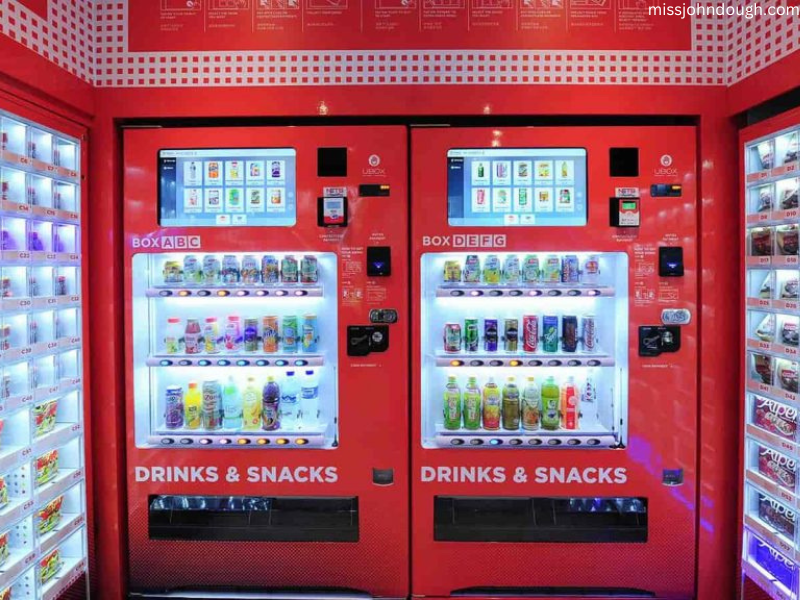The vending machine industry offers a lucrative business opportunity, providing entrepreneurs with a unique chance to generate passive income. With low overhead costs, minimal management requirements, and steady demand across various sectors, the vending machine business is often regarded as a recession-resistant, cash-flow-positive option. As consumer demand grows for convenience and automated services, the vending machine industry is becoming more profitable than ever. For those interested in exploring a vending machine business for sale, this guide will cover all essential aspects to help you make an informed decision.
Why Invest in a Vending Machine Business?
Purchasing a vending machine business is an excellent opportunity for both new entrepreneurs and seasoned business owners. Here are a few reasons why this sector is particularly attractive:
Low Entry Cost
Vending machines require a relatively low initial investment compared to other business opportunities.
Flexibility and Autonomy
Vending machines are self-service, so you don’t need to be physically present to run the business, which provides a high degree of freedom.
Passive Income
The vending machine model generates income continuously without constant oversight, making it ideal for passive income seekers.
Recession-Resistant
Even during economic downturns, people still buy snacks, beverages, and other quick conveniences from vending machines.
Types of Vending Machines in Demand
Before purchasing a vending machine business for sale, it’s essential to understand the different types of vending machines available. Some popular categories include:
Snack and Beverage Machines
These are the most common types of vending machines and are often found in schools, office buildings, and hospitals.
Coffee and Hot Beverage Machines
Increasingly popular in corporate environments, coffee machines offer higher profit margins and cater to a wide range of customers.
Healthy Vending Machines
With a rise in health-conscious consumers, vending machines that stock fresh, nutritious options are becoming more desirable.
Specialty Product Machines
These include machines selling items like electronics, beauty products, and personal hygiene supplies, usually found in hotels, airports, and malls.
Key Considerations When Buying a Vending Machine Business
Purchasing a vending machine business involves evaluating several factors to ensure the investment aligns with your financial and lifestyle goals. Here’s what to consider:
Location Analysis
A vending machine’s location largely determines its profitability. Prime locations include:
Schools and Universities
These institutions have a high volume of traffic and consistent demand for snacks and drinks.
Office Buildings and Corporate Centers
Employees often purchase snacks, beverages, and quick meals from nearby vending machines.
Hospitals and Medical Centers
With long hours and varied shifts, hospitals offer round-the-clock business potential for vending machines.
Public Transport Stations and Airports
High foot traffic and waiting times increase sales potential in these locations.
Type and Number of Machines
Determine the types of machines and quantity you’ll need based on the target market and location type. Consider a balanced portfolio of snack, beverage, and specialty vending machines. Having a diverse range allows you to cater to different customer needs, thereby maximizing profits.
Supplier and Inventory Management
Securing reliable suppliers for inventory is essential to maintain machine stock and product freshness. Establish agreements with wholesale suppliers or consider bulk purchasing to keep costs low. Efficient inventory management ensures that machines are always stocked with popular items, preventing missed sales opportunities.
Business Licenses and Compliance
Research local regulations related to vending machines, including licensing, health permits, and taxation requirements. Some jurisdictions may have specific guidelines for the operation of vending machines, especially if they sell perishable items. Failure to comply with regulations can result in fines or, in extreme cases, business closure.
Maintenance and Repair Costs
Vending machines, like all equipment, require routine maintenance and occasional repairs. Assess the age and condition of the machines included in the business sale and factor maintenance costs into your budget. Regular maintenance not only ensures operational efficiency but also extends the machine’s lifespan.
Payment System and Technology
Consider upgrading to modern vending machines that offer multiple payment options, such as credit card, debit card, and mobile payments. The convenience of cashless transactions can attract more customers and increase sales. Additionally, machines with remote monitoring capabilities can streamline operations by providing real-time data on inventory and sales.
Calculating the Profit Potential of a Vending Machine Business
The profitability of a vending machine business depends on several variables. Here’s a breakdown to help you assess the potential earnings:
Revenue per Machine
On average, a snack or beverage vending machine can generate between $75 and $300 weekly, depending on location.
Operating Costs
Common expenses include product costs, machine maintenance, electricity, and rental fees for the machine location.
Net Profit
After deducting operating costs, the net profit typically ranges from 30% to 50%. Machines in high-traffic areas generally yield higher profits.
Creating a detailed financial forecast can give you a clear picture of potential profits. Consider all fixed and variable expenses to project a realistic return on investment (ROI).
Evaluating Vending Machine Business Listings for Sale
When reviewing vending machine businesses for sale, here’s what to look for to ensure a good deal:
Revenue History
Request financial statements or sales reports for each machine over the last 12 months to gauge monthly and seasonal fluctuations.
Asset Condition
Inspect the machines for wear and tear, ensuring they’re in good working order. Machines in excellent condition are less likely to incur high repair costs.
Existing Contracts and Location Leases
Understand any agreements tied to the business, such as rental fees for prime locations.
Growth Opportunities
Assess potential for expanding the business by adding new locations or types of vending machines to increase revenue.
Steps to Successfully Acquire a Vending Machine Business
Research and Due Diligence
Begin by researching reputable brokers or online marketplaces specializing in vending machine businesses for sale. Conduct thorough due diligence, reviewing all financial records and equipment details.
Secure Financing
If needed, explore financing options through banks, small business loans, or personal funds. Lenders typically require a well-defined business plan for approval.
Negotiate the Sale Agreement
Once you’ve chosen a vending machine business, negotiate terms that cover price, inventory, location rights, and existing service agreements.
Transition Planning
Work with the previous owner to ensure a smooth transition, learning the business processes, supplier contacts, and routine operations.
Scaling and Expanding a Vending Machine Business
After successfully acquiring a vending machine business, consider strategies for scaling operations. Here are a few methods to grow your business and increase profitability:
Expand to High-Traffic Locations
Adding machines to shopping centers, gyms, and transit stations can increase sales volume.
Diversify Product Offerings
Introducing specialty items like electronics, health products, or seasonal snacks can attract a broader customer base.
Invest in Modern Machines
Upgrading to machines with digital payment options and remote inventory monitoring can improve efficiency and customer satisfaction.
Establish a Brand Presence
Building a recognizable brand can create customer loyalty, especially for machines offering unique or healthier options.
Challenges and Solutions in the Vending Machine Industry
While vending machine businesses offer great potential, they come with specific challenges:
Machine Downtime
Technical issues can lead to revenue loss. Solution: Routine maintenance and prompt repairs are essential.
Inventory Theft and Vandalism
Public machines are at risk of damage. Solution: Install security features and monitor locations with high traffic.
Seasonal Demand Fluctuations
Some locations may see lower sales in certain seasons. Solution: Adjust inventory based on seasonal demand, such as adding cold drinks in summer.
Conclusion
Investing in a vending machine business offers an accessible and scalable opportunity for generating passive income. With minimal supervision requirements and a wide range of products to offer, a vending machine business can provide financial stability and room for growth. By choosing the right locations, carefully managing inventory, and ensuring regulatory compliance, a vending machine business can yield impressive returns.
Whether you’re a budding entrepreneur or a seasoned investor, buying a vending machine business for sale is a profitable venture with significant potential. With the right strategies in place, you can optimize your investment and grow your portfolio in this rewarding industry.


